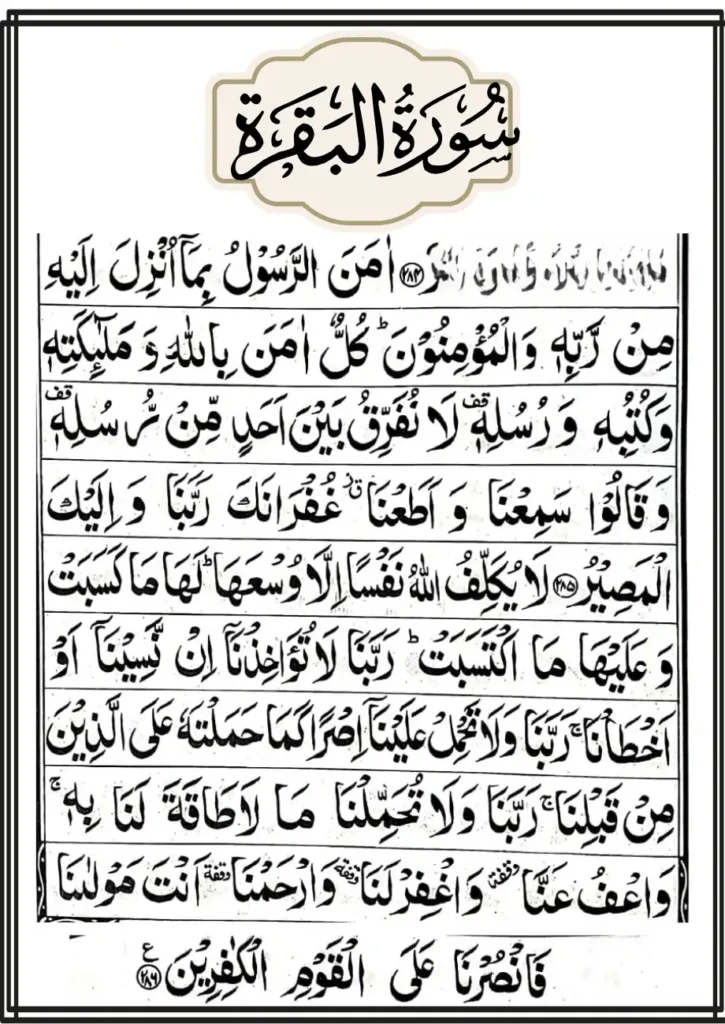Surah Al-Baqarah (Chapter 2 of the Quran) is the longest surah, covering diverse aspects of faith, law, and guidance. The last two ayats (Quran 2:285-286) hold special significance in Islamic teachings, offering immense spiritual and protective benefits.
Known as Āmantu billāh (The Declaration of Faith) and Al-Mu‘awwidhatān (The Two Seekers of Refuge), these verses emphasize belief, accountability, divine mercy, and supplication.
Last Two Ayats of Surah Baqarah (Quran 2:285-286) Words by Words

Breakdown of Surah Baqarah Last 2 Ayat
Verse 285: The Essence of Faith
Arabic: اٰمَنَ الرَّسُوْلُ بِمَاۤ اُنْزِلَ اِلَيْهِ مِنْ رَّبِّهٖ وَالْمُؤْمِنُوْنَ ۚ كُلٌّ اٰمَنَ بِاللّٰهِ وَمَلٰٓىٕكَتِهٖ وَكُتُبِهٖ وَرُسُلِهٖ ۚ لَا نُفَرِّقُ بَيْنَ اَحَدٍ مِّنْ رُّسُلِهٖ ۚ وَقَالُوْا سَمِعْنَا وَ اَطَعْنَا ۚ غُفْرَانَكَ رَبَّنَا وَ اِلَيْكَ الْمَصِيْرُ
Transliteration: Aamana ar-rasoolu bimaa unzila ilayhi mir-rabbihee wal-mu’minoon, kullun aamana billaahi wa malaaa’ikatihi wa kutubihi wa rusulihi, laa nufarriqu baina ahadim mir-rusulih; wa qaaloo sami’naa wa ata’naa, ghufraanaka rabbanaa wa ilaykal-maseer.
English Translation: “The Messenger has believed in what was revealed to him from his Lord and so have the believers. They all believe in Allah, His angels, His books, and His messengers, saying, ‘We make no distinction between any of His messengers.’ And they say, ‘We hear, and we obey. (Grant us) Your forgiveness, our Lord. To You is the (final) destination.’”
Key Themes:
- Absolute faith in Allah, His angels, books, and prophets.
- Unity among believers without differentiating between prophets.
- Submission to divine will and seeking forgiveness.
Verse 286: Mercy, Accountability, and Supplication
Arabic: لَا يُكَلِّفُ اللّٰهُ نَفْسًا اِلَّا وُسْعَهَا ۚ لَهَا مَا كَسَبَتْ وَ عَلَيْهَا مَا اكْتَسَبَتْ ۗ رَبَّنَا لَا تُؤَاخِذْنَاۤ اِنْ نَّسِيْنَاۤ اَوْ اَخْطَاْنَا ۚ رَبَّنَا وَ لَا تَحْمِلْ عَلَيْنَاۤ اِصْرًا كَمَا حَمَلْتَهٗ عَلَى الَّذِيْنَ مِنْ قَبْلِنَا ۚ رَبَّنَا وَ لَا تُحَمِّلْنَا مَا لَا طَاقَةَ لَنَا بِهٖ ۚ وَ اعْفُ عَنَّا ۚ وَ اغْفِرْ لَنَا ۚ وَ ارْحَمْنَا ۚ اَنْتَ مَوْلٰىنَا فَانْصُرْنَا عَلَى الْقَوْمِ الْكٰفِرِيْنَ
Transliteration: Laa yukallifullaahu nafsan illaa wus’ahaa; lahaa maa kasabat wa ‘alayhaa maktasabat; rabbanaa laa tu’aakhiznaaa in naseenaaa aw akhtaanaa; rabbanaa wa laa tahmil ‘alainaaa isran kamaa hamaltahoo ‘alal-lazeena min qablinaa; rabbanaa wa laa tuhammilnaa maa laa taaqata lanaa bih; wa’fu ‘annaa, waghfir lanaa, warhamnaa; anta mawlaanaa fansurnaa ‘alal qawmil kaafireen.
English Translation: “Allah does not burden a soul beyond what it can bear. It will have (the consequence of) what (good) it has gained, and it will bear (the consequence of) what (evil) it has earned. Our Lord do not impose blame upon us if we forget or make a mistake. Our Lord do not place a burden upon us like that which You placed upon those before us. Our Lord do not burden us with what we cannot bear. And pardon us, forgive us, and have mercy on us. You are our protector, so give us victory over the disbelieving people.”
Key Themes:
- Divine justice: Allah does not burden a soul beyond its ability.
- Seeking mercy, forgiveness, and strength from Allah.
- Asking for protection from unbearable trials.
Significance in Hadith and Islamic Tradition
- Prophet Muhammad (ﷺ) said: “Whoever recites the last two verses of Surah Al-Baqarah at night, they will suffice him.” (Sahih Bukhari 5009)
- These verses are part of Ruqyah (spiritual healing) and protection from harm.
Practical Applications in Daily Life
1. Daily Recitation for Protection
- Recite before sleeping for peace and security.
- Include in morning and evening adhkār (remembrances).
2. Strengthening Faith and Patience
- Reflect on the meaning to increase trust in Allah.
- Apply in daily struggles as a reminder that Allah does not burden beyond capacity.
3. Teaching and Memorization
- Use the image as a visual aid for memorization.
- Teach children the benefits and spiritual power of these ayats.
Conclusion
last two ayats of surah baqarah hold immense spiritual power and blessings. They summarize faith, divine justice, and the power of supplication. Incorporating them into daily life can strengthen faith, offer protection, and provide inner peace. May Allah grant us the ability to recite, understand, and live by these powerful verses. Ameen.




